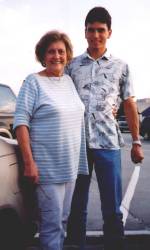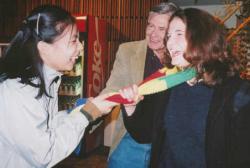| Here is Pawel after he had just arrived from Poland. He took Spanish as his fifth language at his American high school. With him is Ida Mae, a Polish American whose ancestry made her eager to be part of Pawel's "meet and greet" team. |  |
People often ask, "What's required of host families? What are the criteria?" The main criteria are to have a genuine interest in young people and other cultures, a willingness to feed and house a student, and a commitment to be that student's parent(s) while he or she is far from home. The latter component means providing support, assistance in adjusting to America, and rules for behavior. Thus, the international teen becomes another family member, not a guest.
Exchange students participate in their already existing hobbies and in the family's activities, whether playing sports, making music, attending church, having adventures in eating out, gardening, cooking, visiting museums, or possibly even attending weddings and funerals! "What if the student wrecks my car?" doesn't have to be a worry, as exchange students are not to operate any motorized vehicles while on the program.
| Here is Pawel after he had just arrived from Poland. He took Spanish as his fifth language at his American high school. With him is Ida Mae, a Polish American whose ancestry made her eager to be part of Pawel's "meet and greet" team. |  |
The local coordinator is available as a resource for both hosts and students. The United States Information Agency requires that coordinators talk to students and hosts at least once monthly, and see the students every other month. Coordinators furthermore monitor students' grades to ensure program compliance; CETUSA requires that students maintain at least a "C" average in the American schools.
 |
 |
|||||
| This is Hong Kong student "John" (a harmonica player) with American classmates upon his arrival at the Chattanooga airport. We facetiously said that the strech limousine was his ride home. | Jessie from China teases the German girl, Yvonne, with whom she was in a double placement. In the background is host dad, Tom. The location is Chattanooga's science theater, where the students saw a laser show. |